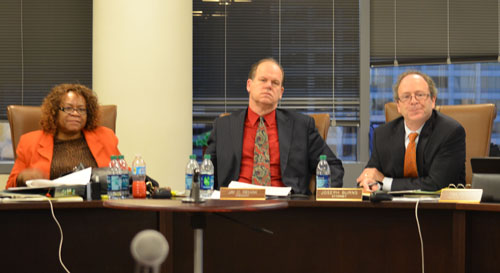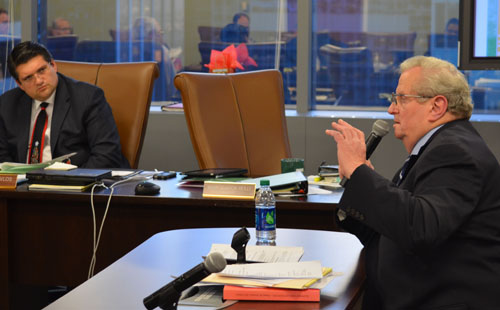Charters are hundreds of thousand of dollars in arrears in required payments... Chicago Teachers Pension Fund expands audit investigation into charter school irregularities in pension payments for eligible charter teachers
The Chicago Teachers Pension Fund (CTPF) is expanding an audit of Chicago's 108 charter schools and campuses following a preliminary report of widespread irregularities in the classification of charter school teachers who should be in the pension fund and widespread delays of payments to the fund for eligible teachers. The CTPF trustees voted at their December 12, 2012 meeting to expand an audit and to hold another meeting on December 19 to further review the problems with charter schools that are becoming more clear.
 Chicago Teachers Pension Fund Vice President Lois Ashford (left), President Jay Rehak (center) and attorney Joseph Burns (right) listen during the presentation about the charter school audit during the CTPF trustees December 12, 2012 meeting. Substance photo by George N. Schmidt.The findings of the preliminary audit were reported to the regular meeting of the trustees on December 12 by auditor Robert Jurinek. While problems in complying with the law were widespread, several of the city's most prominent charter schools, including those who have received major subsidies from both CPS and from corporate donors, were reported to have major problems.
Chicago Teachers Pension Fund Vice President Lois Ashford (left), President Jay Rehak (center) and attorney Joseph Burns (right) listen during the presentation about the charter school audit during the CTPF trustees December 12, 2012 meeting. Substance photo by George N. Schmidt.The findings of the preliminary audit were reported to the regular meeting of the trustees on December 12 by auditor Robert Jurinek. While problems in complying with the law were widespread, several of the city's most prominent charter schools, including those who have received major subsidies from both CPS and from corporate donors, were reported to have major problems.
The auditor's report, for example, notes that Urban Prep's three campuses are "always behind in reporting" the required pension information. As of November 30, Urban Prep was behind more than $45,000 in money that should have been paid to the pension fund immediately.
The five campuses of Perspectives Charter School, according to the auditor's report, require "constant reminders that they owe money and are behind in processing transmittals." As of November 30, Perspectives was behind more than $130,000. Like Perspectives, Aspira's charter schools require regular reminders that they are required to make the payments. As of November 30, they were behind more than $35,000. Longstanding problems with the so-called "Youth Connections Charter School" were also noted by one of the trustees, who told Substance that Youth Connections has been problematic for more than a decade. Youth Connections became a charter school while Paul Vallas was CEO of CPS more than a decade ago. It consists of dozens of what were once small alternative schools, located in scattered sites across the city.
Other problems noted in the report are based on poor record keeping at the charter schools, which then send in changes.
The problems with the charter schools maintaining compliance with state law regarding teacher pensions was also evident during the November election for pension trustees. At that time, teacher members of the pension fund were eligible to vote for two of the six trustees representing active duty teachers. Although the charter schools are required to tell their eligible teachers of the right to vote in the elections, a large percentage of the charter schools did not conduct elections on the day of the election, and their election materials were returned unused. Teachers at those charter schools were thus deprived of their right to vote in the crucial election. The election saw the re-election of CTPF President Jay Rehak and Vice President Lois Ashford.
 Robert Jurinek (right) made a presentation to the trustees of the Chicago Teachers Pension Fund (CTPF) at the public meeting of the trustees on December 12, 2012 (above). Trustee Jerry Travlos (representing the principals and administrators) looks on. Substance photo by George N. Schmidt.The investigation into the charter schools comes at a time when the controversial charters are again poised for expansion in Chicago, with the public support of Mayor Rahm Emanuel and the latest "Chief Executive Officer" of CPS, Barbara Byrd Bennett. Byrd-Bennett has told the public that she will recommend the opening of eight additional charter schools in the coming year, despite growing public opposition. The move to further expand the charter schools comes at a time when CPS is hosting hearings by a "Commission" appointed by Byrd Bennett to propose the closing of additional real public schools because of what she calls "underutilization."
Robert Jurinek (right) made a presentation to the trustees of the Chicago Teachers Pension Fund (CTPF) at the public meeting of the trustees on December 12, 2012 (above). Trustee Jerry Travlos (representing the principals and administrators) looks on. Substance photo by George N. Schmidt.The investigation into the charter schools comes at a time when the controversial charters are again poised for expansion in Chicago, with the public support of Mayor Rahm Emanuel and the latest "Chief Executive Officer" of CPS, Barbara Byrd Bennett. Byrd-Bennett has told the public that she will recommend the opening of eight additional charter schools in the coming year, despite growing public opposition. The move to further expand the charter schools comes at a time when CPS is hosting hearings by a "Commission" appointed by Byrd Bennett to propose the closing of additional real public schools because of what she calls "underutilization."
By law, certified charter school teachers are members of the Chicago Teachers Pension Fund, and the charter schools are required to make regular payments to the fund of pension deductions from teacher paychecks. The charters are also required to maintain accurate and complete records of their teachers for this purpose. Prior to the rapid expansion of Chicago charter schools, payments for all teachers in the fund were made regularly by Chicago Public Schools. Problems began arising almost at the onset of the expansion of Chicago charters, according to one pension trustee who asked to remain anonymous, and have been growing with the expansion of the city's charter schools.
 Panorama of the December 12, 2012 meeting of the trustees of the Chicago Teachers Pension Fund. Substance photo by George N. Schmidt.During the trustees meeting, Jurinek presented the trustees with a list of 28 of the city's 108 charter schools and campuses that presented serious problems uncovered by the audit. Because of the complexity of the audit, the trustees, after discussion, agreed to meet again before Christmas on the issue
Panorama of the December 12, 2012 meeting of the trustees of the Chicago Teachers Pension Fund. Substance photo by George N. Schmidt.During the trustees meeting, Jurinek presented the trustees with a list of 28 of the city's 108 charter schools and campuses that presented serious problems uncovered by the audit. Because of the complexity of the audit, the trustees, after discussion, agreed to meet again before Christmas on the issue
Although the city's charter schools are exempt from some regulations in Illinois, all are required to make regular payments to the CTPF on behalf of their certified teachers, who are members of the fund. Like the teachers in Chicago's real public schools, certified charter school teachers are required to be members of the pension fund.
Among real public school teachers, administrators, including principals, are also members of the CTPF, and when they retiree Chicago Public School principals become recipients of a "teacher" pension. Many of the charter schools bestow titles on their administrators that do not conform to traditional public school administrative titles (such as "principal" or "superintendent"), instead choosing to label their executives using the jargon of corporate America. Just because a charter school calls a certified teacher who becomes an administrator a "Chief Executive Officer," however, does not mean that the charter school can avoid keeping that teacher as a member of the fund.
THE FOLLOWING PRESS RELEASE WAS ISSUED BY THE CTPF IN THE AFTERNOON OF FRIDAY, DECEMBER 14.
FOR IMMEDIATE RELEASE
CTPF Preliminary Audit Reveals Reporting Irregularities
CHICAGO – December 14, 2012 – Chicago Teachers’ Pension Fund recently conducted a preliminary audit of a sample of charter school employers to determine compliance with Illinois law regarding pension contributions. The results showed that more than 30 percent of charter schools were chronically late reporting payroll contributions and in making required payments to the fund.
“We need to ensure an adequate retirement for charter school members, just as we do for members at all other CPS schools,” said Jay C. Rehak, president of the CTPF Board of Trustees. “I am dismayed that our preliminary review indicated a number of reporting irregularities and found that more than 30 percent of Charter Schools are chronically late in making their required contributions on behalf of our members. Based on these results, the CTPF Board of Trustees has authorized a comprehensive audit of all 108 charter schools.”
Though CTPF was properly funded by teachers and their employers from the fund's inception in 1895 through 1995, it has suffered during the last two decades from a chronic underfunding by its primary employer, the Chicago Board of Education. A lack of adequate employer contributions and pension funding "holidays" have resulted in a $3.2 billion loss for the fund since 1995. This funding deficit is a primary reason CTPF’s funded ratio has fallen to 59 percent in 2011, from 100 percent in 2002.
“CTPF is a well-managed fund, and we want to make sure that the problems we’ve seen with our primary employer don’t spread to our other employers,” explained Rehak.
For more information:
Kristin Ellertson
The Reynolds Communications Group
(O) 312-541-9300 (ext. 101)
(C) 847-338-4260
kellertson@reynoldsgroup.com
Comments:
By: John Kugler
Money is Always the Answer
The more you look at the higher levels of accountability at CPS everything always leads back to money.
Clearly if the money is being deducted and then it is not being sent to the proper agency that is was deducted for then that is misallocation of funds. Last time I checked that was illegal.
Why is it an outside agency-- CTPF -- uncovering this and not the OIG? The reason for that is simple: the OIG is chasing down "illlegal" lunch forms applications that are no more than $400 for a student in a year. Yet they send two investigators and months of work hunting down the free lunch thieves! When they are not doing that, it's "tuition" problems, or teacher residency. When was the last time the OIG investigated anything illegal (or unethical) in the charter schools?


By: Rod Estvan
Very interesting about charters
From my discussions with charter school teachers in the past the CTPF deductions are being made from their checks. So this raises the question of some of the charter schools actual cash flows and whether that is why they are falling behind in payments.
Rod Estvan